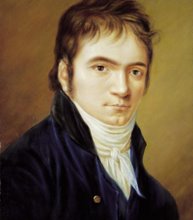Wolfgang Amadeus Mozart (1756-1791)
Before the hard facts, a teeny bit of history: If the practice of Mozart’s infancy and early childhood had persisted, the play would have been called “Gottlieb” or “Theophilus,” not “Amadeus.”
Mozart’s father Leopold was the chapel master (Kapellmeister) for the Roman Catholic Archbishop of Salzburg, and, as seen in baptismal records at St. Rupert’s Cathedral in Salzburg, the name he gave baby Wolfie reflected what Austrian society considered the father’s exalted position in what was then part of the Holy Roman Empire: Johannes Chrysostomus Wolfgang Theophilus. Papa Leopold subsequently substituted “Gottlieb” for “Theophilus.” In those days in that particular society, it didn’t matter because both names mean the same thing: “Theophilus” has been interpreted as “God's love” and "beloved of God" in Greek; “Gottlieb” is its rough equivalent in German. Mozart preferred the more musical-sounding Latin version: “Amadeus.”
The present list, which will be amended, focuses on major works and is by no means definitive:
1775
Concerto for Violin in A major, K. 219 (“Turkish”)
1776
Serenade in D Major, K. 250 (“Haffner”)
Serenata Notturna in D, K. 239 (recalls Boccherini’s serenade, “Night Music of Madrid”)
1778
Concerto for Flute and Harp in C Major, K. 299
Les petits riens ("The Little Nothings"), Ballet
1781
Idomeneo, re di creta ("Idomeneo, King of Crete"), Opera K. 366
1782
12 Variations in C Major on "Ah vous dirai-je, maman," K. 265
1783
Mass in C Minor, K. 427
1785
Concerto in E-Flat Major for Piano, K. 482
Fantasia for Piano in c minor, K. 475
Song, Das Veilchen (“The Violet”), K. 476
1786
Concerto in c minor for Piano, K. 491
Der Schauspieldirektor (“The Impressario”), Opera, K. 486
Le Nozze di Figaro (“The Marriage of Figaro”), Opera, K. 492
Symphony in D Major, No. 38 (“Prague), K. 504
1787
Don Giovanni, Opera, K. 527
1789
Arrangement, Handel’s Messiah, K. 572
1790
Cosi fan tutte (sometimes translated as "Women Are Like That"), Opera, K. 588
1791
Ave Verum Corpus, Motet in D Major, K. 618
Die Zauberfloete ("The Magic Flute")
La Clemenza di Tito, Opera, K. 621
Requiem in d Minor, K. 626
Wednesday, May 16, 2007
Subscribe to:
Post Comments (Atom)






No comments:
Post a Comment